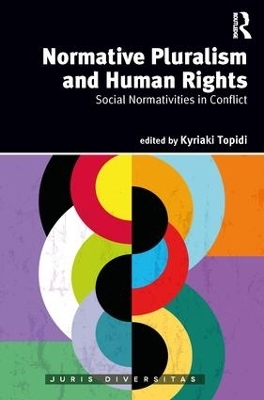
Normative Pluralism and Human Rights
Routledge (Verlag)
978-1-138-05659-6 (ISBN)
This volume studies how normative conflicts unfold when trapped in the aspirations of human rights and their local realizations. It reflects on how such tensions can be eased, while observing how and why they occur. The authors examine how obedience or resistance to the official law is generated through the interaction of a multiplicity of conflicting norms, interpretations and practices. Emphasis is placed on the actors involved in raising or decreasing the tension surrounding the conflict and the implications that the conflict carries, whether resolved or not, in conditions of asymmetric power movements. It is argued that legal responsiveness to state law depends on how people with different identities deal with it, narrate it and build expectations from it, bearing in mind that normative pluralism may also operate as an instrument towards the exclusion of certain communities from the public sphere. The chapters look particularly to expose the dialogue between parallel normative spheres in order for law to become more effective, while investigating the types of socio-legal variables that affect the functioning of law, leading to conflicts between rights, values and entire cultural frames.
Kyriaki Topidi is Senior Lecturer and Associate Director of the Centre for Comparative Constitutional Law and Religion at the Faculty of Law of the University of Lucerne in Switzerland. She has undertaken extensive research in the areas of minority rights, human rights law, comparative constitutional law and law and religion issues. Her current research interests focus on religious diversity in public school systems. She is the author and editor of a number of volumes and articles that problematize the use of human rights in plural settings.
1. Introduction: Conflicts over Justice and Hybrid Social Actors as Legal Agents;
PART I: Preventing Conflict;
2. Beyond the Pedagogical Beauty of Dichotomy: Comparative Law Methodology in Liquid Times;
3. Managing Language in Multicultural Societies: Learning from the Indian Experience;
PART II: Articulating Conflict;
4. De-Religionising Religion: The European Court of Human Rights and the Conflict of Definition;
5. Immigrants or New Religious Minorities? Conflicting European and International Perspectives;
6. Conscientious objection in Swedish and Italian health care: Paradoxical Secularizations and Unbalanced Pluralisms;
7. The Unfinished Education: Religion, Education and Power Struggles in Multicultural Israel;
PART III: Processing Conflict;
8. Feminist Dilemmas: The Challenges in Accommodating Women’s Rights within Religion-based Family Law in India;
9. Tamasha: The Theatrics of Disputing and Non-State Dispute Processing;
10. Can Law ‘Sustain’ Cultural Diversity? The Inheritance Laws of Indian Minority Communities and the Italian Legal System;
PART IV: Resolving Conflict;
11. Multiculturalist Conflicts and Intercultural Law;
12. Addressing the Possibility of Normative Conflicts around Human Rights: The Concept of Adaptation;
13. Adjudication in a Pluralized Legal Field: Proposing Communication as an Analytical Device;
14. Two Legal Orders And One Cause—Or a Way to Simultaneous Decision Making;
| Erscheinungsdatum | 05.09.2018 |
|---|---|
| Reihe/Serie | Juris Diversitas |
| Zusatzinfo | 2 Line drawings, black and white |
| Verlagsort | London |
| Sprache | englisch |
| Maße | 156 x 234 mm |
| Gewicht | 589 g |
| Themenwelt | Geisteswissenschaften ► Religion / Theologie |
| Recht / Steuern ► Allgemeines / Lexika | |
| Recht / Steuern ► Arbeits- / Sozialrecht ► Sozialrecht | |
| Recht / Steuern ► EU / Internationales Recht | |
| Recht / Steuern ► Öffentliches Recht ► Völkerrecht | |
| Sozialwissenschaften ► Ethnologie | |
| Sozialwissenschaften ► Politik / Verwaltung | |
| Sozialwissenschaften ► Soziologie | |
| ISBN-10 | 1-138-05659-6 / 1138056596 |
| ISBN-13 | 978-1-138-05659-6 / 9781138056596 |
| Zustand | Neuware |
| Informationen gemäß Produktsicherheitsverordnung (GPSR) | |
| Haben Sie eine Frage zum Produkt? |
aus dem Bereich


